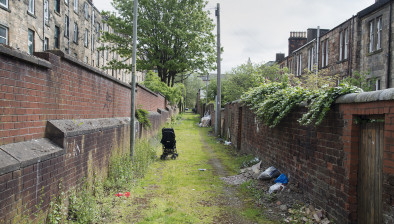UK: Development segregation keeps social housing children out of ‘communal’ playground
Children from the social housing element of a London residential complex are being blocked from playing at a communal play area used by homebuyers at the same development.
Henley Homes got permission to build a 149-home development on the site of the Baylis Old School complex on Lollard Street by promising to include some subsidised, below-market-rent units and “a network of courtyards and open spaces… which will provide attractive areas for informal play”.

The developer said the project will “emphasise the sense of community within the scheme stressing that the common areas are there for the use of all the residents”.
Taking the form of a four-sided shape, three sides of the development are dedicated to private renters, owners and shared ownership schemes. The fourth is a social housing side known as Wren Mews.
Originally the plans submitted to Lambeth Council showed that flats on all four sides had access to the main play area in the centre. However, reports in The Guardian claim the gates from Wren Mews have since been transformed into impassable hedges meaning children no longer have access to the larger garden.
The altered designs gained permission from the local authority, The Guardian added.
The move is an expansion of the odious phenomenon of poor doors, already widespread in London, whereby people who live in subsidised units built in exchange for a planning variance are forced to use a separate lobby to avoid offending the sensibilities of the rich people with whom they share a building.
Henley Homes and Lambeth Council said the duty to provide play space for under-fives has been discharged, because there is a small strip of toddler play equipment specifically for the children from the social homes, which are now being managed by Guinness Homes.
Guinness Homes said it has no control over anything but the social housing block, and could not control access to the private areas of the development.
Warwick Estates, the company that manages the private part of the development, strongly defended its decision to keep the social housing residents out of the shared spaces.
“Although, as you state, the block overlooks the swing area, the residents have no access to it. This is for [a] very good reason – being that [they] do not contribute towards the service charges,” said Emma Blaney of Warwick Estates. “This is in no way discriminatory but fair and reasonable.”









